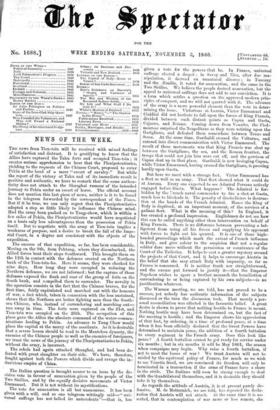NEWS OF THE WEEK.
THE news from Tien-tsin will be received with mixed feelings of satisfaction and distrust. It is gratifying to know that the Allies have captured the Taku forts and occupied Tien-tsin ; it creates serious apprehension to hear that the Plenipotentiaries, yielding to the requests of the Chinese Court, proposed to enter Pekin at the head of a mere "escort of cavalry." But while the report of the victory at Taku and of its immediate result is positive and authentic, we have to remark that the same authen- ticity does not attach to the Shanghai rumour of the intended journey to Pekin under an escort of horse. The official account does not mention this last piece of news, neither is it to be found in the telegram forwarded by the correspondent of the Times. But if it be true, we can only regret that the Plenipotentiaries adopted a step so little likely to influence the Chinese mind. Had the army been pushed on to Tung-chow, which is Within a few Miles of Pekin, the Plenipotentiaries would have negotiated on a basis only less advantageous than the possession of Pekin itself. But to negotiate with the army at Tien-tsin implies a weakness of purpose, and a desire to break the fall of the Impe- rial Court, in a degree not consistent with the objects of the expedition.
The success of that expedition, so far, has been considerable. Moving on the 9th, from Pehtang, where they disembarked, the Allied forces bent their steps Southward. This brought them on the 12th in contact with the defences erected on the Northern bank of the Tien-tsin-ho. Here it seems, they were checked for nine days. How long they were occupied in reducing the Northern defences, we are not informed ; but the capture of those defences exposed the flank and rear of the group of forts on the South bank, and compelled them to surrender. The novelty in the operation consists in the fact that the Chinese braves, for the first time, fairly capitulated and marched out with the honours of war, a fact which, taken in connexion with the loss sustained, shows that the Northern are better fighting men than the South- ern Chinese, who, instead of surrendering and marching out- run away in time. The forts were captured on the 21st, and Tien-tsin was occupied on the 26th. The occupation of this place gave the Allies the absolute command of the water-commu- nications leading to Pekin. An advance to Tung Chow would place the capital at the mercy of the assailants. As it is desirable that a severe lesson should be read to the Mantehou dynasty, the enemies of the Chinese people as well as the enemies of foreigners, we trust the news of the journey of the Plenipotentiaries to Pekin, without the army, is incorrect.
The rebels had again attacked Shanghai, and had been de- feated with great slaughter on their side. We have, therefore, fought against both the Powers which divide and ravage the in- dustrious empire of China.


























